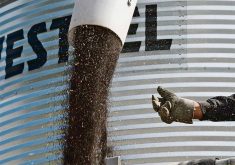Commodity giant Glencore saw its earnings from mining and oils drop last year, but saw a 172 per cent increase in its earnings from agricultural trading — largely due to results from Viterra.
The world’s largest commodity trader on Monday reported overall EBITDA (earnings before interest, taxes, depreciation and amortization) of $12.8 billion on sales of $235.3 billion (all figures US$) for 2014.
Glencore’s EBITDA from metal and mineral activities was down three per cent to $8.6 billion and down 16 per cent to $3.4 billion for energy products, but was up 172 per cent, to $1.2 billion, for agricultural products.
Read Also

U.S. grains: Soy futures pull back as Brazil harvest advances
Chicago | Reuters – U.S. soybean futures fell on Monday on profit taking after a rally last week drove prices…
“The earnings growth was assisted by strong results from Viterra, including the benefit of large crops in Canada and South Australia and a full year of post-integration cost synergies,” Glencore said in notes to its financial statements.
“The record Canadian 2013 crop, a better-than-average South Australian 2013 crop and a South Australian 2014 crop that, despite the dry weather, recovered strongly late on, were all beneficial,” Glencore said.
Regina-based Viterra, a Glencore subsidiary since 2012, is “now fully integrated with significant cost savings achieved,” the company said Monday.
The company said it was “able to overcome the challenges provided by an early season shortage of railroad capacity in Canada, while port facilities in both Russia and Ukraine benefited from strong early crop year export volumes.”
Barring any “significant crop issues,” Glencore said, global crop commodity markets are “likely to remain relatively low-priced and subdued.”
Crop progress so far in both Brazil and Argentina is “excellent and may be at record levels, which is potentially constructive for the oilseed crushing business,” the company said. “Conversely, weak diesel prices will adversely impact biodiesel margins.”
Full-year output from Glencore’s agricultural crushing businesses was up 56 per cent year-over-year, while biodiesel output was up 21 per cent, the company reported. The company’s total raw crop handle was down 14 per cent, and its wheat milling output slipped 10 per cent.
Across all its commodity segments, Glencore for 2014 booked a net profit attributable to equity holders of $2.31 billion on total revenues of $221.07 billion, up from an $8.05 billion loss on $232.7 billion in revenues in 2013. — AGCanada.com Network















